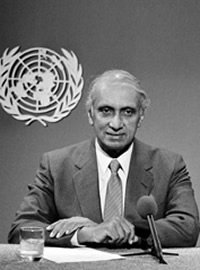 Dr. Gamani Corea, Secretary General of UNCTAD (1974-1984) Photo Credit: UN Photo Library |
His work with UNCTAD dates back to the organization's founding, when he helped to create the Group of 77 developing countries, at the first session of UNCTAD which took place in 1964.
As Secretary-General, he had a reputation as an intellectual who pursued the idea of international economic reforms that could give the world's poorer nations a better chance of long-term development and more effective results from trade.
He paid particular attention to the problems and needs of the Least Developed Countries (LDCs), arguing that they had special concerns and merited special consideration. Accordingly, he focused on achieving better results for poor countries from trade in commodities - the basic farm goods and natural resources that in many cases make up the bulk of LDCs' exports.
He pressed for an Integrated Programme for Commodities around a Common Fund, to bolster trade in commodities, and he later advocated this idea in his book Taming Commodity Markets: The Integrated Programme and the Common Fund in UNCTAD, which was published in 1992. He also actively promoted South-South cooperation.
"Gamani Corea played a significant role in UNCTAD's formative years, helping to mould it into the organization we know today," current Secretary-General Mukhisa Kituyi said. "We owe him a great deal, and his passing is an occasion of great sadness for us."
Jan Pronk, who served as Deputy Secretary-General of UNCTAD during Dr. Corea's tenure, said: "His death is a great loss, not only to his country but also to the international community he had served so brilliantly."
Dr. Corea was born on 4 November 1925. He obtained bachelor's and master's degrees from both the University of Oxford and the University of Cambridge between 1945 and 1952, followed by a doctorate in economics from Oxford. He worked as an economist in various capacities in Sri Lanka before becoming his country's Ambassador to the European Economic Community, Belgium, and Luxembourg, in 1973.
After leaving the United Nations, Dr. Corea continued to pursue his vision of a revamped international economic order, serving with the South Commission from 1987 to 1990, and as a member of the Committee of the South Centre from 1995 to 1998. He went on to serve as President of the Committee from 1998 to 2001.
In Sri Lanka, he founded and chaired the Institute of Policy Studies. He also founded the Sri Lanka Economic Association, which he chaired from 1985 to 1991.
Among Dr. Corea's several books was the 1980 volume Need for Change: Towards the New International Economic Order.
Over his career, he received several honorary doctoral degrees from universities in Europe and Sri Lanka.


